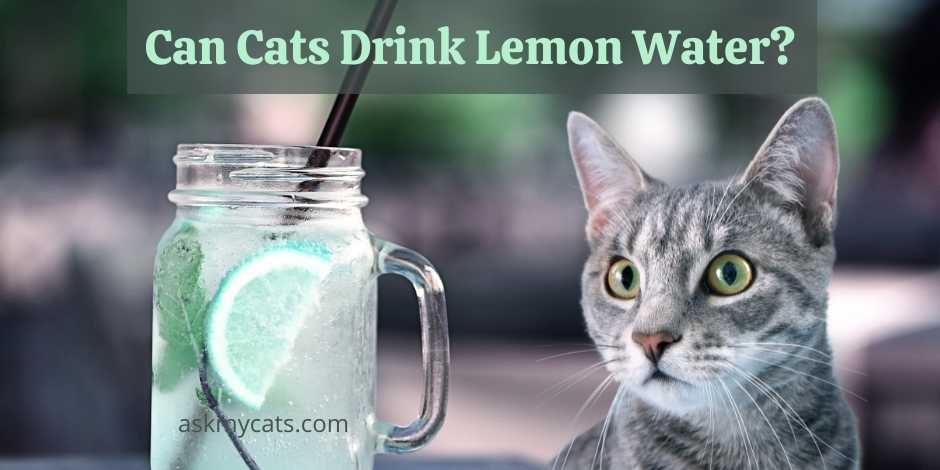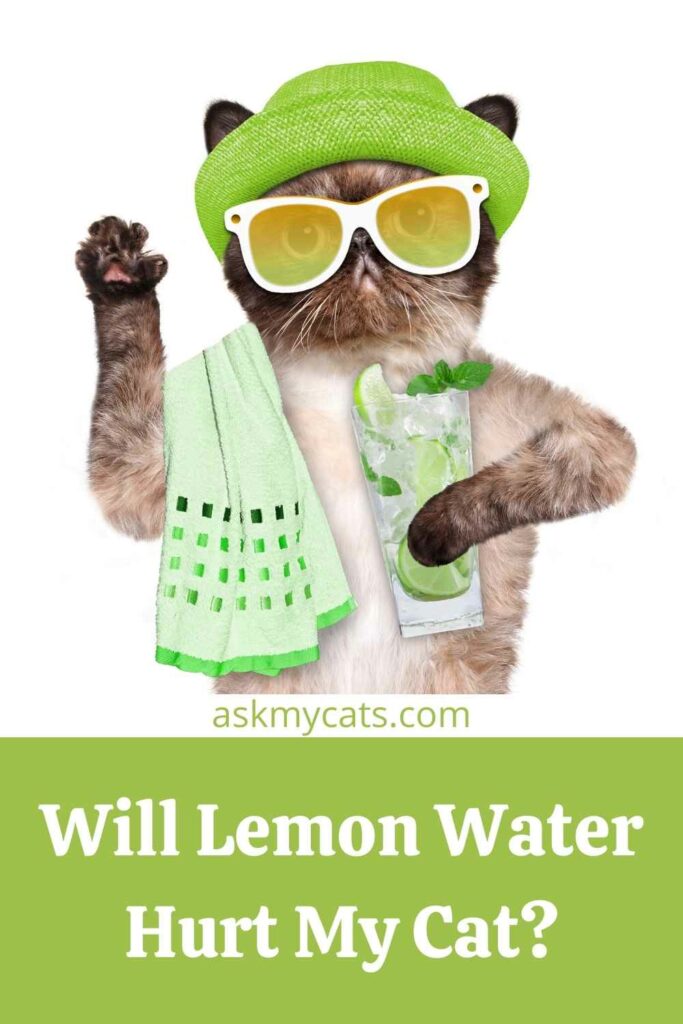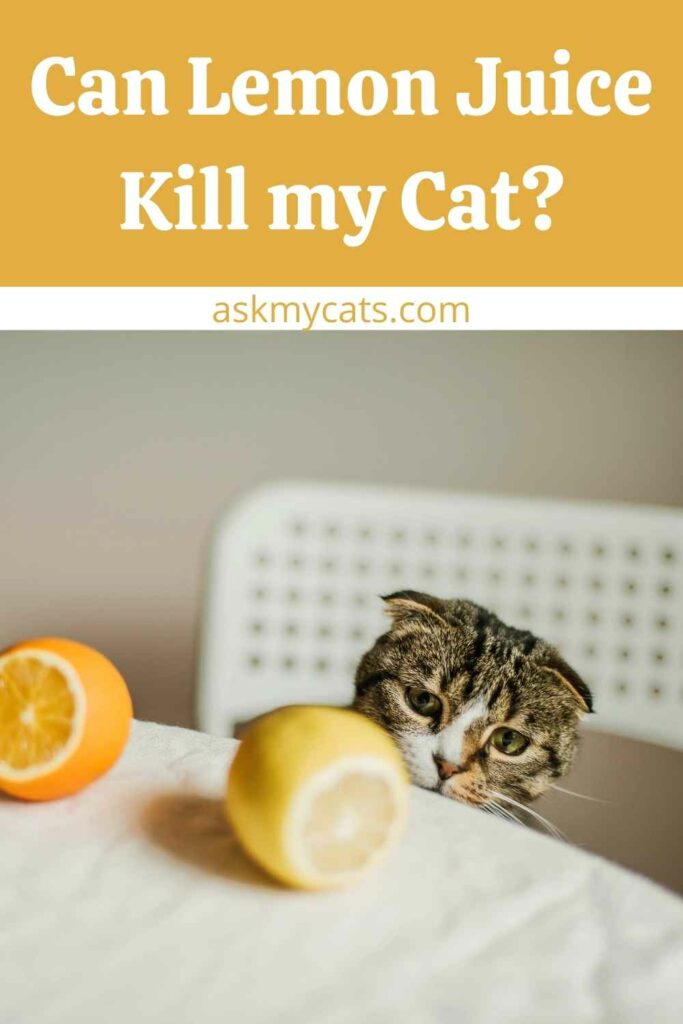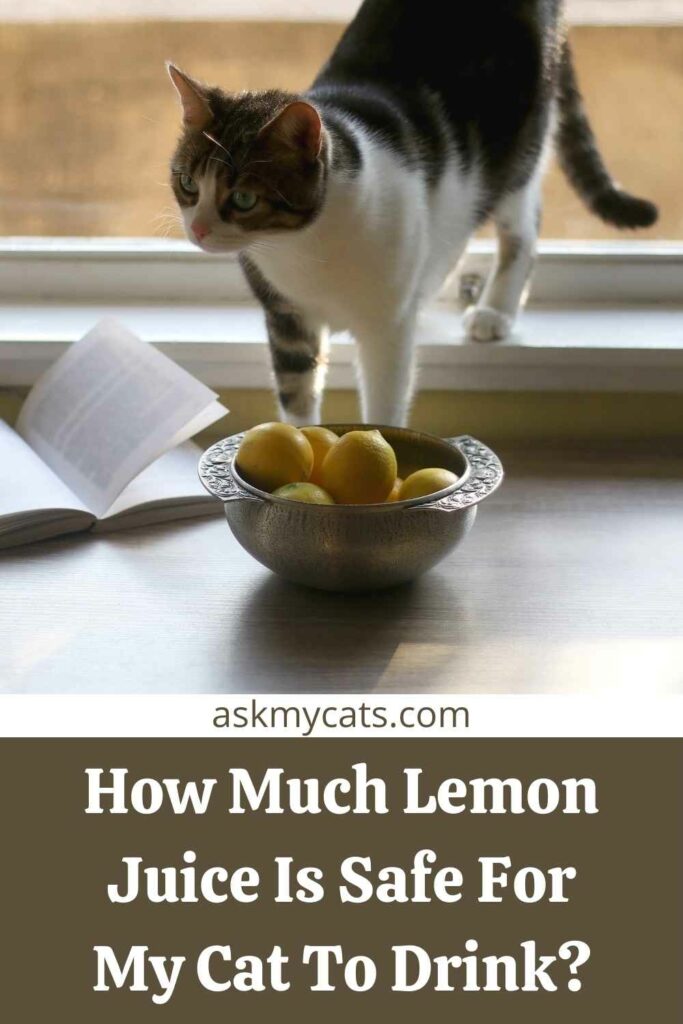Lemon water (and, indeed, most citrus) is very healthy for humans and is often used in cooking and baking. It’s a typical refrigerator item that may be included in a variety of dishes. But is lemon as beneficial to cats as it is to humans?
No, cats should not drink lemon water since all citrus fruits are poisonous to cats, including lemons, limes, oranges, and grapefruit. Lemons are considered harmful for cats since they are high in vitamin C and antioxidants.
Lemons and lemon juice are extremely poisonous to cats, causing everything from stomach pain to convulsions, coma, and death. It’s one of the more harmful meals to be around for cats!


Give Your Cat the Perfect Day
Get the Free Ebook!
Do Cats Like Lemon Juice?
Cats do not like lemon juice since they are not tasty for them.
Fortunately, most cats will avoid citrus of any type, even lemon. Cats are very careful about what they consume (it may not appear that way when they chew on thread, for example, but that’s a different matter) and will avoid hazardous substances.
As a result, it’s a very uncommon cat that would even crave, much alone like, lemon juice. If you have a cat that is more curious than wise, keep lemons and lemon juice away from it, no matter how much it begs to sample some.
When peeling lemons, even people sneeze occasionally. Cats are irritable as well. When your pet sniffs the fruit, it should normally move away. Lemons, as previously stated, contain essential oils that are poisonous to cats. But wait, there’s more. Psoralens are also present in the fruit. Psoralens, when consumed, can induce photosensitivity in your dogs.
Because the peels contain more oils, particularly D-limonene, they are more hazardous. As a result, if you peel the fruit near your cat, you may become poisoned. It’s not a good idea to have lemon-scented cosmetics near your pet. Felines are inquisitive creatures who may sniff your personal care items while you are not there.
Will Lemon Water Hurt My Cat?
Yes, lemon water is harmful for your cat.

Felines are poisoned by all portions of the fruit, including the seeds, pulp, and skin.
The presence of three hazardous chemicals known as limonene, linalool, and psoralene contributes to their toxicity.
The chemical that gives lemons their distinct aroma is limonene. It’s commonly found in dog shampoos and perfumes.
Cats, on the other hand, are particularly sensitive to limonene, unlike most canines who can handle modest doses.
Linalool is also a component of the distinct fragrance and can be utilised as a pesticide.
Psoralen can be used to treat a variety of skin conditions, however it is phototoxic, meaning it produces skin burns when applied to the skin and then exposed to sunlight.
The severity of the signs and symptoms is determined by the amount of lemon consumed by your cat. Smaller doses cause gastrointestinal distress, including a loss of appetite, vomiting, and diarrhoea.
Excessive salivation, drooling, loss of energy, sadness, low blood pressure, chilly limbs and paws, light sensitivity, tremors, muscular weakness, behavioural abnormalities, and mortality are some of the most significant clinical manifestations.
It should be emphasised that if your cat suffers lemon poisoning, forcing vomiting is not suggested (this can lead to aspirating lemon oil, which only aggravates the situation).
Rather, act swiftly and make an emergency trip to the veterinarian’s office.
Can I Put Lemon Juice In My Cats Water?
You should not put lemon juice in your cat’s water.
Can Lemon Juice Kill my Cat?
Lemon juice contains powerful antioxidants and oils, and cats are poisoned by them. Lemons are particularly hazardous to cats due to the presence of linalool, limonene, and psoralens.

Even in small amounts, the linalool and limonene can cause stomach upset, vomiting, and diarrhoea, while the psoralens can cause sunburns on your pet’s skin when exposed to sunlight, which is why we don’t recommend using them to get rid of fleas (you have to make sure you rinse it off thoroughly, and you’re better off finding a sensitive skin product from your vet).
Lemon juice or lemons, even in tiny amounts, can cause the following:
- Diarrhoea
- Excessive drooling
- Vomiting
- Lethargy
- Skin irritation or rash
Lemon poisoning in cats can induce symptoms such as photosensitivity, sadness, and lethargy, as well as weakening, liver failure, collapse, and death.
Take your cat to the vet straight away if it eats any lemon. It is not suggested to induce vomiting because even breathing in the oils of lemons is enough to create issues. To protect the cat from absorbing any more lemon, a vet may have to undertake a stomach cleanses and employ activated charcoal.
Most cats will recover if you get them to the doctor quickly enough, and you’ll only have to keep an eye on them for a few days to make sure they don’t relapse.
Make a thorough inspection of your home to ensure that all lemon-related items are securely stored. If nothing else, the strong acidity of lemons and lemon juice is enough to make a cat sick even if just a tiny amount is consumed, so it’s simply not worth exposing them to it. Lemon juice is unpleasant to a cat’s system at best and lethal at worst.
How Much Lemon Juice Is Safe For My Cat To Drink?
Even a modest amount of lemon juice might induce stomach discomfort and other gastrointestinal issues in your cat.

Other, more significant health conditions might develop fast depending on how sensitive your cat is.
Lemon juice is harmful to cats, and since it has little nutritional value and no attraction, it’s doubtful that your cat would want anything to do with it in the first place.
Keep lemons and lemon juice out of your cats’ reach and don’t allow them have it on or in their food.
One of the most contentious applications for lemon juice is as a natural flea repellent for cats, especially those that have difficulties with flea collars and topical medications.
Many pet owners swear by rinsing their pets with lemon water in key locations (ears, armpits, tail base) to kill and repel fleas. However, this is an extremely dangerous move. Any lemon juice licked off by your cat as part of their usual grooming routine might make them sick, and too much lemon can cause sunburns.
These are about as good at repelling and killing fleas as lemon juice, but with a lot less risk to your cat! You should also discuss a treatment plan with your veterinarian that is both safe and effective.
Lemon Juice For Cat With Fleas
Lemon water and lemon juice have been proven to be effective in removing fleas from your cat’s body, bedding and furniture in a natural way.
However, while this natural anti-flea cure is effective, it is not safe for your cat.
Although spraying your cat with lemon water is less dangerous than allowing your cat to drink the lemon water, we all know how much cats love to lick themselves.
If you spray even a small quantity of lemon water on your cat, it’s likely that the cat may eat the concoction and get poisoning symptoms.
What Should I Do If My Cat Licked A Lemon Juice?
To begin, understand that just because your cat consumes lemon juice does not imply it will become ill. The amount of food consumed, your cat’s age, and weight will all influence whether or not your cat exhibits any of the aforementioned symptoms, such as diarrhoea, lethargy, vomiting, skin irritation, tremor, or seizures.
If your cat eats a large amount of lemonade, such as a whole glass, this may be excessive. Lemon juice that has been concentrated is more hazardous than lemon juice that has been diluted.
So, if your cat consumes lemon juice, you should immediately contact a veterinarian. Your veterinarian will almost certainly want to know how much you ate.
After that, activated charcoal would be added to prevent the juice from being absorbed by the bloodstreams. In extreme situations, dogs should be given intravenous fluids. If your cat experiences a seizure, she should stay at the clinic overnight for observation and treatment.
Frequently Asked Questions
Is Citrus toxic to cats?
If cats ingest citrus fruits, they may develop stomach discomfort, as well as skin irritation if their skin comes into touch with one of these fruits. Citrus fruits include essential oil extracts such as limonene and linalool, as well as psoralens, which are harmful to cats.
Can I give my cat lime water?
Limes are harmful to cats; hence they are not allowed to eat them. You should keep your canine companion as far away from limes as possible.
Are cats attracted to lemon?
Oranges, lemons, limes, and other citrus fruits irritate cats. These odours are even included in some cat repellents to help keep cats away. Essential oils (such as eucalyptus, tea tree, peppermint, and others) have been reported to be particularly toxic to cats.
Final Words
Lemon water, when applied appropriately and in precisely calculated doses, can be effective in removing fleas from cats.
The usage of lemons in cats, on the other hand, is frequently connected with hazards that can, more often than not, result in death.
As a result, it would be beneficial to analyse each circumstance separately and carefully weigh the rewards and hazards. In most circumstances, the disadvantages of utilising lemons for cats exceed the benefits.
